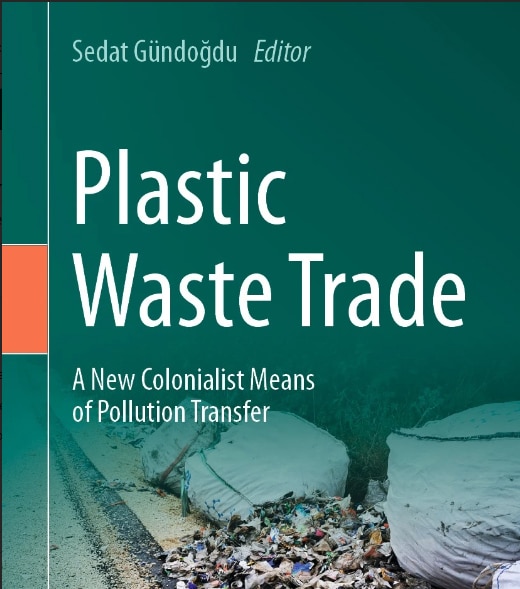Distant reading case study "waste colonialism"
📖 This case study is discussed in my postcolonialism lecture for the MA DC Machines of Knowledge course to showcase a postcolonial reading of a contemporary data set. The lecture introduces postcolonial theory as a diverse academic approach that developed over time and is now practised by researchers from different backgrounds. As a consequence, definitions and goals of postcolonial theory are also contested, and some scholars have offered provocative revisions of how we read the colonial past.
Waste management and waste reduction as global issues
The term waste colonialism is used by researchers, activists and NGOs. It refers to the practice of affluent nations exporting their waste, including plastics, e-waste or used fashion, to poorer countries. This practice, critics argue, disproportionately impacts vulnerable populations and ecosystems. As developed nations reduce waste in their own countries, also to meet environmental goals in the face of climate change, they often ship their garbage to the Global South, which gives the problem a (post)colonial dimension (The Or Foundation, n.d.).

Several academic books now give an introduction to waste colonialism, often focussing on specific aspects such as plastic waste exports. One book you might find helpful is Plastic Waste Trade: A New Colonialist Means of Pollution Transfer, edited by Sedat Gündoğdu (2024) and published by Springer Nature in 2024.
Waste impact in the Global South discussed in YouTube comments
Many videos on YouTube cover aspects of what we consider data colonialism, but not all videos may officially use that term, which is why building a suitable playlist for data scraping can be difficult. One playlist whose videos unfortunately have no or very few reviews is the Stop Waste Colonialism YouTube playlist curated by the Or Foundation (n.d.-b). According to their mission, this foundation is "a public charity in the USA and a registered charity in Ghana that has been operating in both countries since 2011" and helps disadvantaged groups and regions "escape the predominant violent socio-economic system of corporate colonialism and to change it from within." (The Or Foundation, n.d.-a). In this effort, the vision of the Or Foundation aligns with many other NGOs fighting global waste problems, e.g. in the Pacific Ocean, and of scientists that track the journeys of waste from country to country. Although their playlist is not suitable for text analysis per se, it can lead you to similar YouTube content with a sufficient number of comments. You can also search for terms like "waste export", "fast fashion" or "climate colonialism" to find interesting videos.
Questions for data analysis
In a data analysis with Voyant Tools, you can try and answer the following questions:
- What patterns do we see in global flows of plastic waste, textile waste, and e-waste? Which of these patterns are addressed in the user comments and how do the users perceive them? Are they fully aware of the complexity of global supply chains?
- Do the users critically consider their own roles in waste production, e.g. as buyers of cheap fashion made abroad?
- How do different YouTube users from different countries and social backgrounds respond to the social and environmental impact of waste exports?
- What opportunities for change are discussed in the data set? Who is pushing for change and why?
Please use different tools in Voyant to come to interesting insights and consider comparing several text files.
Cited Works and Further Readings
- Chakrabarty, D. (2008). Provincializing Europe: Postcolonial thought and historical difference (2nd ed.). Princeton University Press. https://press.princeton.edu/books/paperback/9780691130019/provincializing-europe
- Fatah-Black, K. (2015). White lies and black markets: Evading metropolitan authority in colonial Suriname, 1650-1800. BRILL.
- Fuller, S., Ngata, T., Borrelle, S. B., & Farrelly, T. (2022). Plastics pollution as waste colonialism in Te Moananui. Journal of Political Ecology, 29(1), 534–560. https://doi.org/10.2458/jpe.2401
- Guldi, J. (2022). The long land war: The global struggle for occupancy rights. Yale University Press. https://doi.org/10.12987/9780300264869
- Gündoğdu, S. (2024). Plastic waste trade: A new colonialist means of pollution transfer (1st ed.). Springer Cham. https://doi.org/10.1007/978-3-031-51358-9
- Manieson, L. A., & Ferrero‐Regis, T. (2022). Castoff from the West, pearls in Kantamanto? A critique of second‐hand clothes trade. Journal of Industrial Ecology, 27(3), 811–821. https://doi.org/10.1111/jiec.13238
- Manglou, M., Rocher, L., & Bahers, J. (2022). Waste colonialism and metabolic flows in island territories. Journal of Political Ecology, 29(1), 1–19. https://doi.org/10.2458/jpe.2836
- Melken, R. V. (2021, February 23). Decolonising knowledge: What is decolonisation? Studium Generale. https://sg.tudelft.nl/event/decolonising-knowledge-what-is-decolonisation/
- Peryman, M., Cumming, R., Ngata, T., Farrelly, T. A., Fuller, S., & Borrelle, S. B. (2024). Plastic pollution as waste colonialism in Aotearoa (New Zealand). Marine Policy, 163(106078). https://doi.org/10.1016/j.marpol.2024.106078
- The Or Foundation. (n.d.). Homepage – #Stop Waste Colonialism. https://stopwastecolonialism.org/
- The Or Foundation. (n.d.-a). Mission. https://theor.org/mission
- The Or Foundation. (n.d.-b). Stop Waste Colonialism [YouTube playlist]. YouTube. https://youtube.com/playlist?list=PL9MlUgj6K-_ihjD1IlNvjS4uKI6Q--xjP&si=bB1zZiwjy5HgSUS8
- Thapa, K. (2023). Closing the Circular Economy Loophole: On fair governance for European waste exports [Dissertation, Utrecht University]. https://doi.org/10.33540/1747